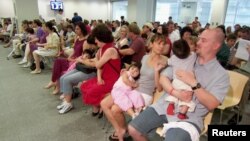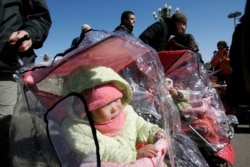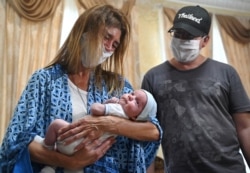When the COVID-19 pandemic hit earlier this year, many countries shut down their foreign adoption programs as borders closed and lockdowns began.
In the months that followed, many countries made changes to adoption procedures in response to the pandemic. In the United States, adoptive families headed to places like Taiwan and Hong Kong are required to comply with increased safety protocols and health measures during travel, which may include two-week quarantines and testing.
Other countries such as Colombia and Bulgaria are loosening in-person visitation rules to allow for visits via video chat to help parents and children bond before they travel together.
“They've made that first bonding trip one that can occur virtually so that the prospective parent and the child are still getting that benefit of meeting and getting to have initial contact, but that it's minimizing transmission risk,” said Lauren Jiang with Spence-Chapin Services to Families and Children, an international adoption organization.
However, China remains as one of the few countries which have not resumed finalizing adoptions. The National Council for Adoption, an American adoption advocacy group, estimates that there are more than 250 families that either had travel approved right before China’s pandemic entry restrictions were put in place, or are now at the point in the process where they are waiting to receive travel approval.
Rebecca Tolson with Nightlight Christian Adoptions, an international adoption organization, told VOA that in the past several years, Nightlight has helped about 20 US-China adoption cases each year, but this year, only two have been finalized.
Several American families whose adoptions were suspended in the pandemic spoke with VOA about their experiences.
“Where Is Joshua?”
If there were no pandemic, the Madill family’s newest adoptive son would be playing with his elder brothers.
They were supposed to welcome Joshua to the family in China on Feb. 10. But on Jan. 28, they were told that the trip had to be postponed indefinitely.
For more than 10 months, the couple never unpacked their suitcases. “Unpacking the suitcases would feel like giving up on it,” Suzi Madill, the mom, said. “We're ready to go at a moment's notice.”
As time passes by, Joshua has grown from a two-year-old to a three-year-old.
The couple adopted their third son from China in 2017, and that trip only took them 17 days. This time, the two-week trip has turned into a journey with no end in sight.
Suzi’s husband Jon Madill tried to explain to their sons about the delay the pandemic has caused, but they just kept asking “Where is Joshua? We have been talking about it for so long! When is this going to end?”
“They might not fully understand,” Jon Madill said.
The Gilsdorfs are in the same situation, waiting for months to pick up their adoptive daughter “Sydney.”
When doing this interview, Karen Gilsdorf was on vacation with her husband and daughter in Disneyland. She said if their younger daughter Sydney had been picked up on time, it would have been four of them on this trip.
Gilsdorf’s daughter Alexis Gilsdorf was also adopted from China. She was very excited when she heard she’s going to have a baby sister from China.
“She can't wait to play with her and swim with her and teach her,” Karen Gilsdorf said. “She cannot wait to have a sibling around.”
The Gilsdorfs are fully prepared to accommodate Sydney, even her special needs.
“We already have a pediatrician lined up, so when she comes home, we can get her all checked out,” Karen Gilsdorf said.
But earlier this year, the Gilsdorfs were told that they couldn’t pick up Sydney as planned.
Karen Gilsdorf said the hardest thing the pandemic has brought them is waiting endlessly.
“You just want to hug them and love them and start that whole bonding process. These kiddos need families and they need love,” Karen Gilsdorf said. “It's hard to not be able to give that to them right now.”
In the past several months, the Madills and the Gilsdorfs could only see their new children in some pictures and short video clips the adoption organization provided.
US-China child adoptions drop, then stop
Over the last ten years, about 2,000 Chinese children were adopted each year by American families. Those numbers started to drop before the pandemic hit, with just 1,475 adopted in 2018, and 819 the following year.
Last month, the U.S. State Department announced that China is still not processing inter-country adoptions of children.
The China Center for Children's Welfare and Adoption, a public charity organization authorized by the Chinese government to be responsible for intercountry adoptions, told VOA the suspension of the intercountry adoption process is due to the fear that the children might be infected with COVID-19 when they go abroad. They said there is no timeline for resuming the process.
Adoption agencies and the families they are working with argue it’s in the children’s interest to be united with their adoptive families as soon as possible.
“Many children who come to join families through inter-country adoption are living in institutional settings prior to joining their family,” Jiang said. “Not all children. There are foster care opportunities in some countries, but many children are living in institutionalized settings, often under-resourced.”
“The longer a child stays in an institution, in the orphanage, the more incidents will result from it. For every three months in an orphanage, there is about a month of delay cognitively. So if a child has been in an orphanage for a year, that's four months of delay that they're going to internalize,” Suzi Madill said. “So the idea is to get children home as quickly as possible and start the attachment process, start the process of transition.”
Families urge action as cases drag on
Both the adoption organizations and adoptive families are urging the Chinese government to work with the U.S. State Department to develop a path forward with reasonable health measures to reopen travel for inter-country adoption as soon as possible.
Karen Gilsdorf said she and other adoptive families are willing to make necessary compromises.
“If we need to all just fly on one specific flight over there and pick one hotel to stay in and not leave it, we will do what is necessary to keep everyone safe but to bring these kids home,” she said.
Tolson of Nightlight Christian Adoption said Hong Kong made an exception for adoptive families where families are required to have a COVID test 48 hours before boarding their flight and get tested again once they land. She thinks a lot of families would undergo a two-week quarantine in China to be able to adopt the children and bring them home.






